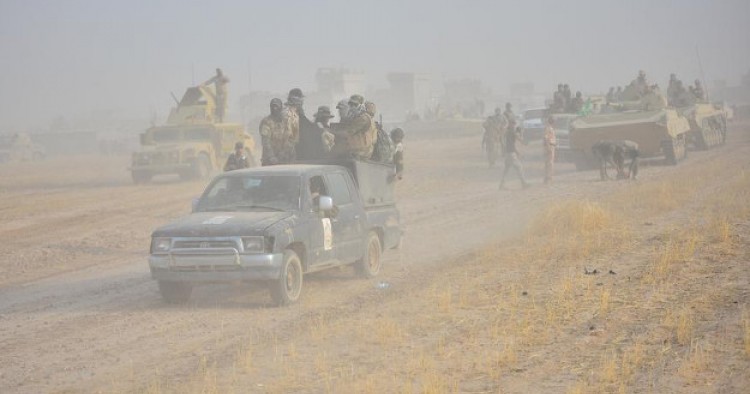On Thursday, Abu Mahdi al-Muhandis, the operational chief commander of Iraq’s Popular Mobilization Forces, announced the start of the first phase of a military operation to liberate the town of Hawija in the disputed province of Kirkuk. The P.M.F. vice-chairman explained that the offensive began from four main fronts: the Iraqi security forces and P.M.F. paramilitary troops will first capture al-Shirqat, a Sunni Arab town in Salahuddin Province, and then advance into Hawija. Al-Muhandis traveled ti Kirkuk on Monday and met with Abu Reza al-Najjar, the military commander of the northern zone in the province.
Separately, Iraqi Prime Minister Haider al-Abadi also announced the start of the operation and the Iraqi Joint Operations Command said the offensive will be “swift.” On September 1, Ali al-Husseini, a P.M.F. spokesman, revealed that the paramilitary forces will will participate in the upcoming Hawija operation. He added that “Daesh [Islamic State] terrorists have to choose between death and surrender,” and that “there are no negotiations with this terrorist group and those whose hands are stained with the blood of the Iraqi people.” According to al-Husseini, the P.M.F. forces will coordinate their efforts with the Iraqi security forces. He also revealed that Hashd al-Turkmani, an Iranian-supported P.M.F. group, had begun withdrawing its forces from Tal Afar and Mosul in order to deploy them to Hawija.
Comment: The offensive comes just four days before the Iraqi Kurdistan is set to hold an independence referendum, including in Kirkuk. Most of Kirkuk is under the control of Kurdish Peshmerga forces, which seized the areas three years ago after Islamic State fighters drove out the Iraqi security forces from the region. The Peshmerga do not take part in the Hawija operation but hold the frontlines rom the eastern side. According to Iran’s Fars News Agency, the Kurdish Regional Government last Wednesday deployed two battalions of Peshmerga forces and PKK militants to Kirkuk to assist Kurdish forces in the region against a perceived threat from P.M.F. paramilitary forces. It is feared that Kirkuk becomes a flashpoint between Iranian-backed Iraqi militia forces and Kurdish Peshmerga in the aftermath of the referendum vote. According to Iran’s Fars News Agency, the Kurdish Regional Government has deployed two battalions of Peshmerga forces and P.K.K. militants to Kirkuk to assist Kurdish forces in the region against a perceived threat from P.M.F. paramilitary forces.
The Middle East Institute (MEI) is an independent, non-partisan, non-for-profit, educational organization. It does not engage in advocacy and its scholars’ opinions are their own. MEI welcomes financial donations, but retains sole editorial control over its work and its publications reflect only the authors’ views. For a listing of MEI donors, please click here.













